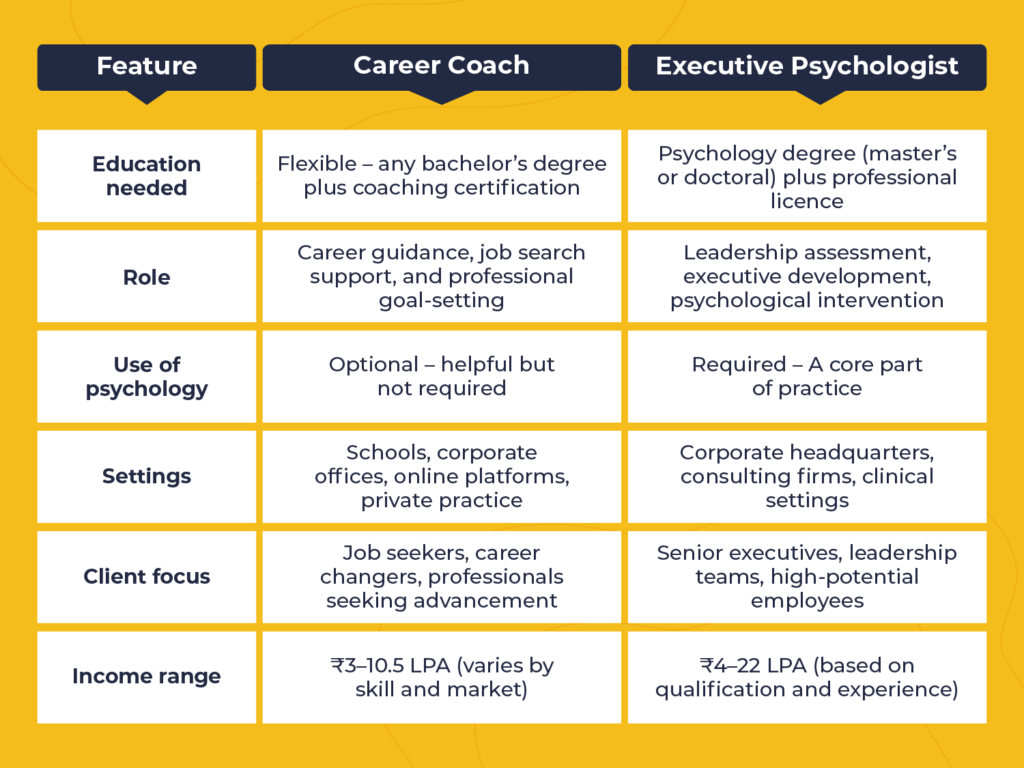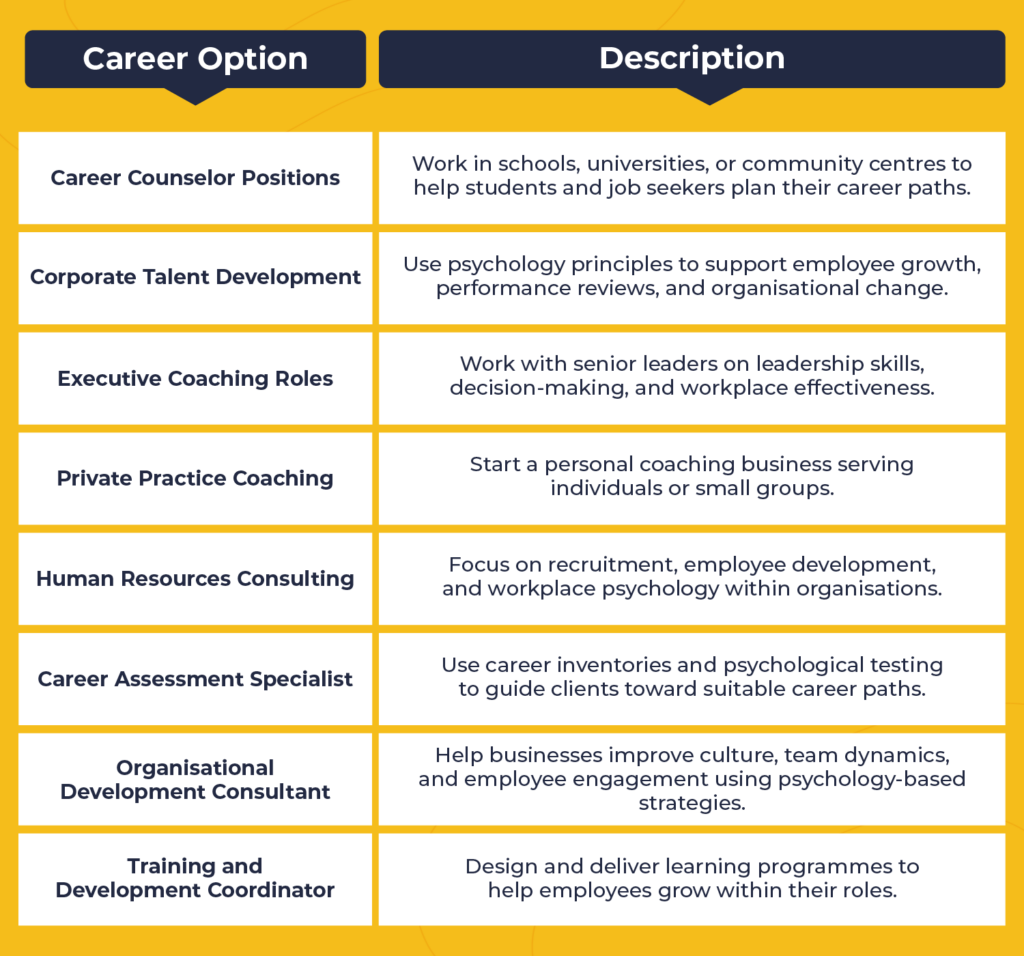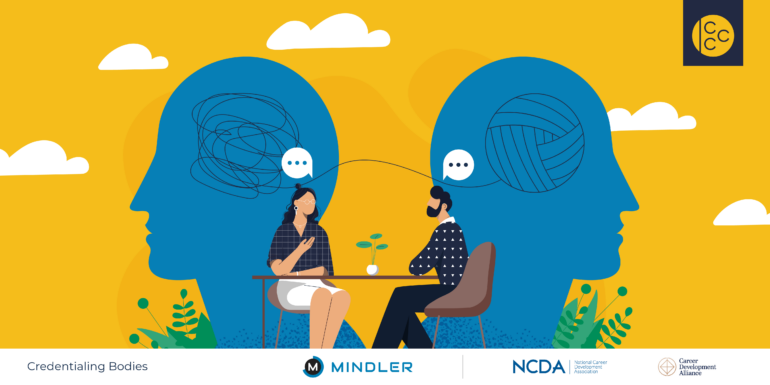Many people wonder if they need a psychology degree to work as a career coach. This question is of concern to both the psychology graduates venturing into psychology careers and those professionals in other careers who may be interested in pursuing life coaching. Qualifications of career coaches are extremely varied within the industry. A personal career coach needs a different kind of training than an executive psychologist. Jobs involving psychology and career psychology exist in many forms and the knowledge about these differences can give the individuals an insight into the choice of their career.
What Is a Career Coach?
A personal career coach is a specialist who assists individuals in making career-related choices regarding their working life and professional advancement. Career coaches offer assistance in searching for jobs, writing resumes, planning career goals, and developing professional coaching skills. They deal with individuals who aspire to change their careers, earn promotions, or enhance their performance at work.
Career coaches practise across a number of different settings:
- Corporate environments – Most firms employ in-house coaches that facilitate employee progress in the company and develop leadership skills.
- Private practice and consulting – Independent coaches deal with single customers through one-on-one sessions, group workshops and online coaching courses.
Does a Psychology Background Matter?
It is still widely believed that a coaching career requires a background in psychology. This is one of the common myths about psychology as a career. However, in practice, a psychology degree and licence are not mandatory. Career coaches can be professionals in different fields of study who have received proper training.
- Legal requirements: There are no official legal requirements in India to earn a degree in psychology to be a career or life coach. Only clinical psychologists are required to be registered with the Rehabilitation Council of India but this is limited to therapeutic work, not in coaching.
- Industry data: The International Coach Federation and other coaching organisations do not need a certification in psychology. The majority of certified coaches hold a degree in business, education, HR, or communication in India and worldwide. This trend is observed in Indian coach training organisations, where professionals with non-psychology backgrounds are accepted.
Therefore, becoming a career coach from any background is possible for professionals who pursue proper training and hands-on experience.
When Psychology Helps
Psychology knowledge is useful when complex behavior problems need to be addressed or the clients are receiving in-depth career counselling services offered by career coaches. There are certain coaching functions that may use insights about human behaviour, motivation, and psychological assessment methods. A psychology background helps in these areas:
- Behavioural change work – Coaches who assist clients to overcome career-limiting behaviours, including fear of networking or interview anxiety, benefit from knowledge on the psychological principles and intervention methods.
- Career therapy services – Some coaches offer services that are close to counselling, assisting clients in processing career-related depression, anxiety, or life changes that impact their career life.
- Executive psychology roles – Working as an executive psychologist requires understanding organisational psychology, leadership assessment, and psychological testing methods that support executive development programmes.
Coach Training and Certification Options
Career coaches in India have various academic backgrounds. A degree in psychology is helpful but not essential. The most important thing is to match your education with credible coach training. Certifications add structure and trust, with recognised options in India including:
- The International Certified Career Coach Program (ICCC) – The only NCDA-approved pathway in India offering accessible entry and structured learning that transforms career coaches from any background into globally recognized experts with industry-leading credentials.
- International Coach Federation (ICF) – Globally respected, with accredited programs across India
- Coach Transformation Academy (CTA) – Offers ICF-accredited training tailored for Indian professionals
- Global Career Counsellor (GCC) – Focused on school and college career guidance
- Erickson Coaching India – Known for solution-focused coaching methods
- NLP certifications – From IANLP or ANLP India, useful for behaviour-based coaching
These programmes build coaching skills, provide practical experience, and help establish credibility in the profession.
Experience and Professional Coaching Skills
Career coaches need practical experience and specific professional coaching skills regardless of their educational background:
- Communication abilities: Active listening, asking effective questions, giving constructive feedback, and helping clients identify their goals and obstacles.
- Human resources experience: Understanding recruitment processes, salary negotiation, workplace dynamics, and employment law basics helps coaches give practical advice.
- Assessment tools knowledge: Familiarity with personality tests, skills assessments, and career interest inventories helps coaches match clients with suitable career paths.
- Job market expertise: Knowledge of current hiring trends, industry requirements, resume formats, and job search platforms helps coaches provide relevant guidance.
- Practical coaching experience: Conducting mock interviews, reviewing resumes, facilitating career planning sessions, and helping clients develop professional networks.
Career Opportunities
Psychology graduates have many options for their career after psychology studies. The field offers flexibility for people who want to combine psychological knowledge with career development work. Career opportunities for psychology graduates in coaching include both traditional psychology career paths and alternative options.
Career options include:

Comparison: Career Coach vs Executive Psychologist
Career coaches and executive psychologists both support professional growth, but their roles, training, and methods differ. Career coaches focus on goal-setting, job search, and career transitions, often without needing a psychology degree. Executive psychologists, on the other hand, rely on formal psychology training to work with leadership and behaviour at a deeper level. Both represent viable careers for psychology students seeking different professional paths.

Summary & Recommendations
The evidence shows that a psychology background helps career coaches but is not required. People can successfully become a life coach through various educational paths and professional experiences.
- For psychology graduates – Your education provides valuable knowledge for career psychology jobs, but you need additional coaching training and practical experience to work effectively with clients.
- For non-psychology professionals – You can develop strong career coach qualifications through certification programmes, practical experience, and ongoing professional development without a psychology degree.
Regardless of your background, invest in quality coaching certification programmes and supervised practice to develop professional coaching skills.
Conclusion
Becoming a career coach from a different professional background is entirely possible. You do not need a psychology degree, though psychological knowledge can enhance your effectiveness in certain coaching roles. Both psychology career paths and alternative routes lead to successful coaching careers. The most important factors are developing strong coaching skills, gaining practical experience, and obtaining appropriate certifications for your chosen speciality area.








